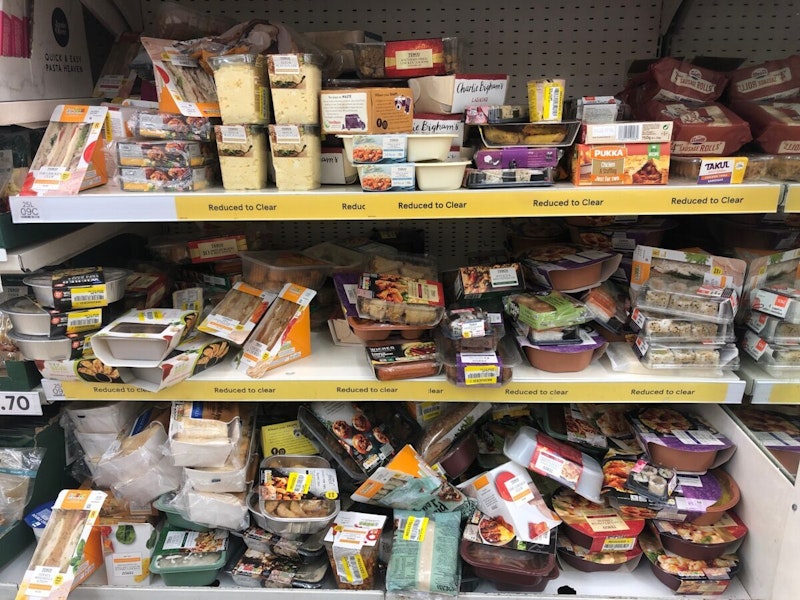Study Notes
GCSE Geography | Food Waste (Resource Management - Food 8)
- Level:
- GCSE
- Board:
- AQA, Edexcel, OCR, Eduqas
Last updated 17 Oct 2024
Food loss - when food has to be thrown out before it reaches the supermarket shelves as it's deemed not good enough to sell - this might be because it has been stored poorly, packaged incorrectly or something has happened during transportation, for example, fruit may be bruised or refrigeration hasn't worked properly. In some cases it is down to aesthetic reasons - supermarkets often reject fruit and vegetables that they regard as 'ugly'.
Food waste - when food is thrown out by supermarkets or households, usually because it has reached it's 'best before date' - this is a huge problem in HICs, but not really an issue in LICs and NEEs.
The extent of food waste
Around a third of food produced around the globe is either lost or wasted, with the figure in some HICs much higher (40% of food is thrown away in the USA). The USA, Canada, Belgium and Australia waste the most food per person. In the UK we throw out 9.5 million tonnes of food every year.
One of the biggest wastes of food is the produce that is rejected for cosmetic reasons, for example vegetables that might be oddly shaped, or fruit which has blemishes on the peel that isn't even going to be eaten. But there are other reasons for food waste - some of it is down to shops, supermarkets and restaurants over-ordering products so not being able to sell everything, some of it is down to a lack of education about how to dispose of food waste, for example, supermarkets throwing waste straight into the bin when it could be donated to people in need, and a lack of understanding over expiration dates, meaning that food is either thrown out when it is still fine to eat, or it is allowed to go off before being used.
Food waste in LICs is often due to poor storage and transportation, meaning that food deteriorates quickly after being harvested.
This food waste contributes to food insecurity around the world. It also causes issues in terms of disposal with most food waste ending up in landfill, which is expensive and gives off high levels of methane as it decomposes, which is a greenhouse gas and contributes to climate change. It is also expensive for households too - on average each household in the UK wastes £700 of food each year.

Confusing labels!
One of the things that doesn't help food waste is the confusion around labelling which often leads us to throw away food when it is still perfectly good enough to eat - but what do the labels on our foods mean?
Sell-by date - this is for the retailer and not the consumer and states when the product has to be sold by. This date doesn't actually mean that the product is no good after then - it usually has around 1/3 of its shelf life left so therefore is perfectly safe to buy and eat.
Use-by date - this tells consumers when a product needs to be eaten by - food is still safe to eat on its use-by date but shouldn't be eaten after unless it has been frozen.
Best-before date - this is about the quality of food and not safety, once this date has passed the food will still be safe to eat but might not be at its best anymore. Best-before dates appear on a wide range of goods including frozen foods, dried foods such as pasta and rice, and tinned food.
Reducing food waste
At home
In the UK 60% of food waste comes from households. At home we can reduce food waste by pre-planning meals so we buy exactly what we need from the supermarket and don't waste money on food that might not get eaten. We could also batch cook in bulk, freezing leftover portions to be eaten another day, and check the food in the fridge regularly so we know what needs to be eaten and when. Having a compost bin or heap in the garden means that anything that does get thrown out will be recycled as a soil improver.
Supermarkets
The Grocer magazine reports that supermarkets throw away 100,000 tonnes of food that is fine to be eaten every year, and that all of the UK's food waste could feed 30 million people (half of the UK population). Supermarkets have faced heavy criticism in recent years regarding the food that they waste and need to educate their staff more about how to reduce food waste and carefully monitor their stock to ensure that everything gets sold and not thrown away. More recently things have improved - supermarkets regularly label products as 'reduced to clear' (see image below) in order to sell them instead of throwing them away, they also sell at discount products which has been damaged in transit, such as tinned goods which are dented, and have started to sell 'ugly' or 'wonky' veg at a cheaper price than regular produce. Finally most supermarkets now donate surplus food to charities and organisations, such as food banks and those that support homeless people.
On farms
There is a significant amount of food wasted at the point of growth - sometimes this is down to bad weather, or sometimes it is not harvesting crops on time, or storing them poorly. Farmers can now invest in new technology that enables them to monitor how their crops are growing so they know the perfect time to harvest them, reducing the risk of them spoiling. They can also increase the number of retailers they sell to which will reduce the risk of having leftover produce, think carefully about when they schedule their growing, but also compost anything that is wasted on site, so they can use wasted food as a natural fertiliser to return nutrients to the soil.
Hospitality
Restaurants, bars and pubs all contribute hugely to food waste, however, there are several ways the hospitality industry can cut down on food waste. They should look at consumer habits and order stock with that in mind, thinking about how seasons affect the popularity of some dishes, as well as ensuring that they don't over-purchase products. Food should be stored safely and correctly, and clearly labelled so it is easy to see when it needs to be used by. And like supermarkets, restaurants, bars and pubs could donate any leftover food to local charities or organisations.

Food waste organisations in the UK
- The Real Junk Food Project - this charity redistributes leftover food from supermarkets and hospitality venues and donates it to schools, organisations and charities
- Too Good To Go - this is an app where users can see which restaurants close to them offer a 'magic bag of food' for a bargain price which would otherwise be thrown out
- The Felix Project - this charity collects fresh produce from retailers and hospitality venues that cannot be sold and passes them onto food banks, organisations such as those supporting the homeless, or local schools
You might also like
What is a Resource?
Study Notes
Energy - the Coal Trade
Study Notes
Energy - the Oil Trade
Study Notes

When the new Resource Frontier is on the sea bed 2km below the surface
13th September 2017
McDonalds to start using paper straws
18th June 2018
Resource Management: Energy - GCSE MCQ Quiz
Quizzes & Activities
‘Clear the Deck’ Interactive Revision Quiz for Paper 2: Resource Management - UK
Quizzes & Activities
Daily Email Updates
Subscribe to our daily digest and get the day’s content delivered fresh to your inbox every morning at 7am.
Signup for emails